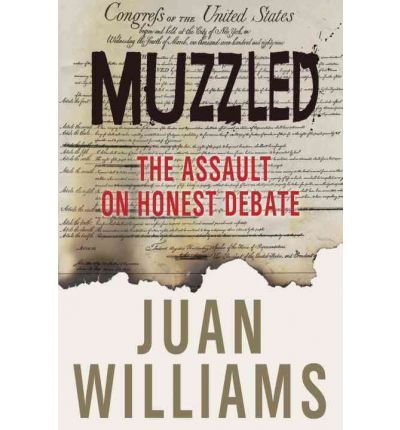
Muzzled
The Assault on Honest Debate
کتاب های مرتبط
- اطلاعات
- نقد و بررسی
- دیدگاه کاربران
نقد و بررسی

August 8, 2011
"When our biggest concern is not whether our words are true but whether our words will result in punishment, then we are giving away our most precious freedom." A long-time journalist for NPR, Fox News, and The Washington Post, Williams (Enough) tackles political correctness and the polarization of debate in America, but not before thoroughly explaining his departure from NPR. Although the airing of his grievances becomes tiresome, he redeems his book when he turns to the national scene. The theme of free speech is woven throughout his own story and his examination of partisan politics, taxes, immigration, and polarizing issues like abortion. He writes: "The voice of honest debate in America has been muzzled. And as those voices of honest debate have grown silent, the quality of our political institutions has been diminished." As he warns against "politically entrenched thinking protected by special-interest groups and lobbyists," he analyzes recent events, such as the 2010 health care debate and the 2011 Wisconsin public-sector union debacle, while also providing historical context. Though short on solutions, Williams's passionate cry for real discussion will inspire readers.

June 15, 2011
A plea to make the world safe for bad-mouthing Muslims against the big bad PC police of the Far Left.
Self-described middle-of-the-roader Williams (Enough: The Phony Leaders, Dead-End Movements, and Culture of Failure That Are Undermining Black America—and What We Can Do About It, 2006, etc.), now a fixture on Fox News, was famously relieved of his duties as an NPR commentator after having confessed to getting queasy aboard planes in which certain passengers are "dressed in garb that identifies them first and foremost as Muslims." Here, the author recounts that removal, generalizing from his experience to lament a world in which free speech is supposedly suppressed in the interest of political correctness. True enough, we live in a time when the gravest offense often seems to be to give offense in the first place, even though there are plenty of people—and plenty of them on Fox—who make good livings doing just that. Williams is not especially convincing in that generalization; to read this account, it seems he may just have had a toxic relationship with his boss, herself recently gone after a political misstep of a different kind. To be fair, he concurs that some Fox types, particularly the soon-to-be-gone Glenn Beck, are guilty of stifling and shouting and incivility, though this admission comes in a rather roundabout way: "So while my friends at Fox frequently and courageously expose the use of this tactic of political correctness by the Left, it's important to remember that the Right plays this game too." Most of the book is unobjectionable—sure, it'd be nice if we could all play nice and Al Franken wouldn't roll his eyes at Mitch McConnell. Even so, much of the narrative is a long exercise in complaint about his bad treatment at the hands of NPR management, in which Williams overlooks, it seems, the Ailesian right-to-work credo, which holds that all employees serve at the pleasure of their bosses and there's no such thing as tenure or appeal. Who lives by the sword, after all...
In the end, about the last thing the civil-discourse cause needs, namely more self-interested preaching to the choir.
(COPYRIGHT (2011) KIRKUS REVIEWS/NIELSEN BUSINESS MEDIA, INC. ALL RIGHTS RESERVED.)

Starred review from July 1, 2011
Williams was fired from National Public Radio in 2010 for speaking his mind on a Fox News program, admitting to fears of boarding an airplane with passengers dressed in Muslim garb. Here he aims to set the record straight on what happened and to examine the broader issue of intolerance. Williams had for some time worked as a commentator for both NPR and Fox, enduring criticism from both ends of the political spectrum, a position that he argues gives him an important perspective on how it is that we've come to such a point of contention. He offers a historical overview on political debates from the Federalist Papers to the Great Society's social programs. He analyzes the forces that led to the political correctness movement of the 1970s and the conservative backlash that followed up with its own intolerance on issues of religion, patriotism, and taxes. Williams impugns the motives of critics on the Left and the Right who use or criticize perceived intolerance when it suits their purposes, all the while using ideological litmus tests, and he charges that the media have contributed to the lack of honest debate by looking for sensational sound bites. All this comes at the high cost of thwarting serious discussion on important issues. Readers of every political persuasion should appreciate Williams' heartfelt, compelling appeal. HIGH-DEMAND BACKSTORY: Prizewinning journalist Juan Williams uses his very public firing from NPR to launch a critique of the state of political debate in the U.S. in a book sure to get plenty of media attention.(Reprinted with permission of Booklist, copyright 2011, American Library Association.)

























دیدگاه کاربران